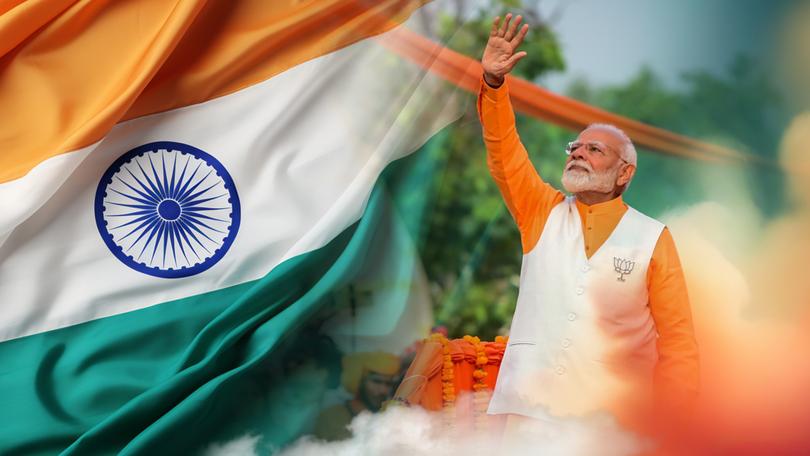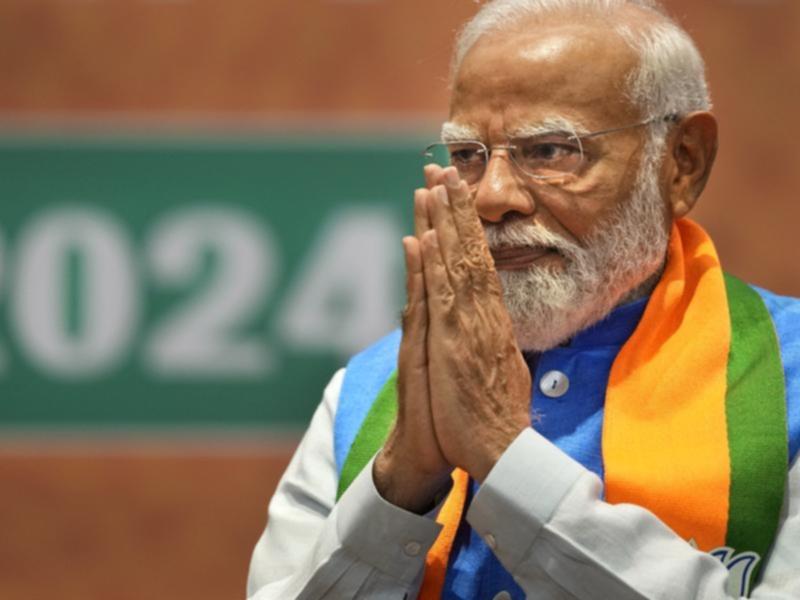HAYDEN NELSON: In his pursuit of a third term, Indian PM Narendra Modi claims to have been ‘sent from God’

While the world’s eyes are firmly fixed on the upcoming presidential election in the United States, closer to home another election is taking place to rival the Biden vs Trump battle in terms of global significance.
Voting has just closed in India, where about 60 per cent of the country’s one billion registered electors have cast their ballots across six weeks, some in sizzling 50C heat.
The themes that have dominated the Indian poll will be familiar to watchers of the American political cycle — allegations of corruption appeals to nationalism, the cult of personality and widespread social media misinformation.
Sign up to The Nightly's newsletters.
Get the first look at the digital newspaper, curated daily stories and breaking headlines delivered to your inbox.
By continuing you agree to our Terms and Privacy Policy.But in a campaign tactic unlikely to be copied by Trump or Biden, Indian strongman Prime Minister Narendra Modi has just ended the chaotic campaign with a 45-hour meditation session.
With results to be announced on Tuesday, exit polls predict Modi’s ruling BJP party will win a third term in a landslide. But in a country as huge and diverse as India, polls are notoriously unreliable.
Modi, whose roots are embedded in far-right conservative Hindu politics, has banked his campaign on winning the majority Hindu vote, but at what cost? His religious nationalist views don’t exactly have the same mass appeal with the country’s hundreds of millions of Muslim voters. His punt is to please most of the people most of the time.
Modi launched his campaign in Ayodhya, on the site of the Babri Masjid, a 16th-century mosque destroyed by Hindus — to whom the site is also sacred as the birthplace of the god Ram — when anti-Muslim sentiment boiled over into violence in 1992. In riots that followed, hundreds of people — predominantly of the Muslim minority — were killed.

Modi has not just blurred the lines of religion and government in secular India this election, he alley-ooped them into the void. In the final week of campaigning, he told Hindu supporters he had been “sent by God”.
Modi’s populism might be enough to get him over the line, but he hasn’t just annoyed religious groups, he’s angered farmers too. Many believe he hasn’t done anything to stop large companies profiteering by artificially inflating the prices of staples like rice, agitating farmers who feel ripped off and getting the country voters (who are the majority) offside.
Then there are also those who believe if Modi achieves his target of a two-thirds majority of 400 seats in the Lok Sabha (the Indian lower house), he’ll have the majority needed to change the constitution, destabilising religion and democracy. Modi, however, is seen as having broad shoulders and being a great communicator as well as the least corrupt politician in India, for the simple reason that he doesn’t have a family.
One reason Indians love Modi is his focus on wealth creation and the development of big businesses in India.
After exiting his marathon meditation, Modi said he “could feel a divine energy”. That’s certainly the kind of energy which could be used to describe the Formula 1 momentum of India’s economy. Under Modi, the subcontinent has dramatically out-developed the Western world, with GDP rising 8 per cent in the past year.
It is now on track to be the world’s third-biggest economy by 2030, a fact seized on by Modi’s BJP party as an argument for another term. The BJP party machine has characterised opposition leader Rahul Gandhi’s Congress party as being casteist and more focused on wealth sharing than the trickle-down of wealth creation. That will perhaps be a vote winner in India’s south, where communism has gained a huge amount of support, particularly among young men.
As India looks towards the 2030s, Modi will likely further wind back protectionist policies, and promote trade and business in India. It’s good news for foreign investors who are keeping an eye on equity markets in India. As America looks for economies other than China to fulfil its tech manufacturing gaps, India is seen as a solid alternative, already possessing the tech industry and know-how. But there will be challenges.
India’s worldview is totally different to Australia’s. India’s foreign policy view is to act in its own interests, rather than to support its allies; it has a long-standing relationship with Russia and is currently no friend of Canada.
There are a million or so Indians living in Australia and Anthony Albanese knows this well. So far he has had no hesitation in literally embracing Modi’s populism, by giving the Indian Prime Minister a hug and describing him as “the boss”, during a gathering at Sydney’s Qudos Bank Arena last year.
Albanese also knows that India will prove increasingly important as a strategic partner. Expect Australia to be doing much more business with India under Modi in a third term. Even with the world’s biggest election revealing arrests of opposition members, religious discrimination and fights with farmers, Albanese will likely keep the next prime minister high up on speed dial, no matter how different their politics may prove.
